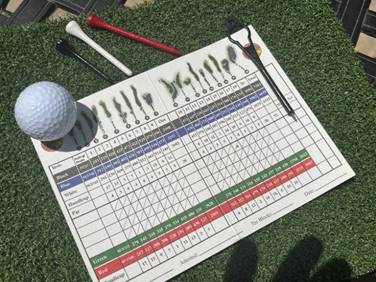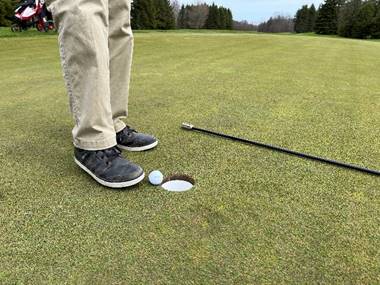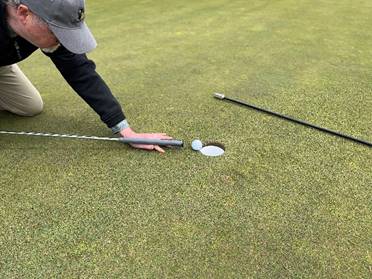
“Golf is a game in which you yell ‘fore’, shoot six and write down five.” – Paul Harvey
If it’s not a baseball team stealing signals or some high-profile athlete taking performance enhancing drugs, it’s a corrupt politician or business type breaking the rules. In this success-obsessed world of ours, cheating is often the portal to fast tracking that success.
Golf, the self-proclaimed gentleman’s game, isn’t squeaky clean. Cheating knows no bounds when it comes to age, skill level and deceit. And while there may be varying degrees of cheating on paper, who’s to say that kicking a ball from a poor lie is any more flagrant or deceptive than not posting all scores into the handicap system.
Sadly, cheating, particularly the willful variety, isn’t a one-off bad decision, an act of desperation, or a momentary lapse of reason. It’s a character flaw. They say you can learn a lot about someone on the course. Put it this way: there’s a good chance that someone who cheats at golf cheats elsewhere.
In recent years, the poster child for tarnishing the game’s reputation has been the shadowy Patrick Reed, a PGA Tour star with a less than commendable past dating back to his college days.


First there were his bunker escapades during the third round of the 2019 Hero Challenge. Less than a year later at the 2020 U.S. Open at Winged Foot, he was accused of improving his lie as he prepared to hit a chip shot on the ninth hole. Then, a few months later at the 2021 Farmers Insurance Open at Torrey Pines, there was much contention around his decision to mark and pick up his ball in the rough before an official could evaluate whether the ball was embedded. TV footage clearly showed that the ball bounced after it landed.
(Note: Reed was penalized two shots for grounding his club in the sand at the Hero Challenge; he received no penalty at Winged Foot, and was given a free drop at the Farmers Insurance Open).
Whether these accusations would hold up in a court of law doesn’t matter. The backlash had many players and fans asking the same question: is cheating a problem in golf?
‘Yes’, would be the quick answer if you talk to club pros and amateurs. But punishing cheating and eradicating it is anything but easy.
Cheating, at least in golf, can be a muddy issue. Says Rich Morel, general manager at the Carrying Place Golf & Country Club in King, ON: “The rules can be difficult to understand and are often broken by misunderstanding and not malice.
“Every day people break the rules without actually knowing they’ve done so. We all have. But if there are people intentionally cheating — dropping an extra ball and claiming they found the original, as an example — then that is cheating and there should be zero tolerance.”
Identifying cheating, calling out the alleged cheater, and meting out disciplinary action is anything but cut-and-dried:
· Was the perpetrator’s intention a conscious one, a perceived one by a playing partner, or perhaps the result of the player in question not knowing the rules?
· Was the infraction the case of someone stretching a rule to its limits, and leaving open to interpretation whether there was a rule violation?
· What if the perpetrator is a star player at the club? Or a board member, a guest at a member-guest day or, heaven forbid, the club’s pro, manager, or president? Would the witness — or pro if the incident escalates — have the gumption to make the call?
That’s where things can get sticky. Rules enforcers (i.e. club pros, managers) can get caught between a rock (Board) and hard place (membership) if a cheating incident escalates to them and perhaps requires more than an on-the-spot decision.
One area where cheating is common and can be policed is a club’s handicap system. Posting one’s scores — all scores, good and bad — is critical to maintaining the game’s integrity. Wannabe scratch players need to post their high scores, and higher handicaps bent on winning net prizes need to post their low scores. But talk to players at any club and you have to wonder if the handicap system is working at all.
That’s why it’s critical for all clubs to have at least one certified handicap official, as well as a handicap committee. In fact, Golf Canada requires that all of their member clubs have both of these in place. Clubs that don’t have someone overseeing handicaps are asking for disgruntled members.
Morel says the best policy for dealing with cheating is just that — a club policy, in writing, that clearly lays out how cheating will be handled.
“The hardest part is having to make a decision with no policy in place. In that scenario it feels as though it’s you against the individual; even though they’re in the wrong, you’re in a tough place.
“There needs to be a policy that management and members can refer to. The policy should lay out the repercussion of the offence to allow management to enforce the rule, as opposed to feeling as though they’re making the decision to ban someone from events etc. Ideally, make it more about enforcing the policy to reduce friction.”
A worst-case scenario: everyone involved turns a blind eye to the situation. Even worse is if the perpetrator is a repeat offender. Having a known cheater on the loose and no one wanting to deal with it can be a big blow to club morale.
Action or no action is an easy decision, says Justin O’Leary, head professional at Cedar Brae Golf Club in Scarborough, Ont. “I will always prefer to deal with the individual that is causing the issues, as opposed to dealing with the other members that are suffering from his or her dishonesty.”
Golf’s stringent rules make it at once an honourable sport and an occasionally convoluted one. Trouble is, save for the most educated rules officials, who knows the rules—especially the obscure ones—inside and out? Club pros, you would think, and perhaps amateurs competing at the highest levels.
Morel says it’s not so much about being able to rhyme off the rules as it is knowing how to apply them.
“Pros should certainly have an understanding of the rules,” he says. “The key is knowing where and how to make the appropriate ruling, not having the rules and decision book memorized.”
“Absolutely not,” O’Leary adds when asked whether a pro should be able to rhyme off the rules. “I think it’s a fair expectation to have your professional team up to date on the rules. It’s important that they know the basic rules, and that they always have a rule book handy during competitions.”
So, would the game be better served—and cheating minimized—if more players knew the rules? Conversely, would laying down the law take away some of the enjoyment of playing the game and slow down play even more? Most people won’t sit down with a good book, much less spend the time to go through the 156 online pages of the R&A/USGA’s Rules of Golf.
O’Leary suggests that learning to read putts would be time better spent.
“I would hate to think how long the average round of golf would be if every person played by every single rule.
“If players were all forced to learn the rules, I suspect that participation levels would drop. I will be the first to say that there are a number of rules in the rule book that could be classified as ‘dumb’”.
Interestingly enough, there seems to be consensus among those interviewed that golf’s rules can weigh the game down, from both a pace of play and enjoyment standpoint.
“Basically, if prizes or money is involved, rules must apply to everyone,” says Steve Leblanc, head professional at the Westfield Golf & Country Club in Grand Bay-Westfield, NB.
“But if you are playing at a good pace, respecting the course, your fellow playing partners, and other course users, and you are not in a competition, then I don’t care if you have three-foot wedges a hole.”
Adds O’Leary: “In casual play, I am completely okay with certain rules being applied. Every golfer has taken a ‘gimmie’ at one time or another during a casual round, and this should continue to happen. There is no need to have golfers marking an 18-inch putt just so they can tap it in after their playing partner has finished out.
“There is also a good percentage of golfers that play the game just for the exercise aspect. They have no desire to compete and to play by the rules, which is totally fine.”
And what about if push comes to shove, if, say, a pro or manager were confronted with a cheating situation that could jeopardize their job?
Morel provides this advice. “A great GM I worked with put it simply: ‘We all know the difference between right and wrong. Do what’s right and you can’t go wrong.’”
Still, doing what’s right should entail getting the facts straight in the first place.
Says O’Leary: “If someone is going to be accused of cheating, there needs to be 100 per cent clear evidence that it happened.” To ensure that happens, Leblanc “always talks to all players in the group to get the full story before making a decision.”
There’s perhaps a silver lining to the cloud that so-called role models like Reed have cast over the game. It’s certainly opened the discussion around cheating, and clubs we spoke to are obviously prepared to deal with it. Nonetheless, cheating isn’t about to go the way of the persimmon wood anytime soon.











